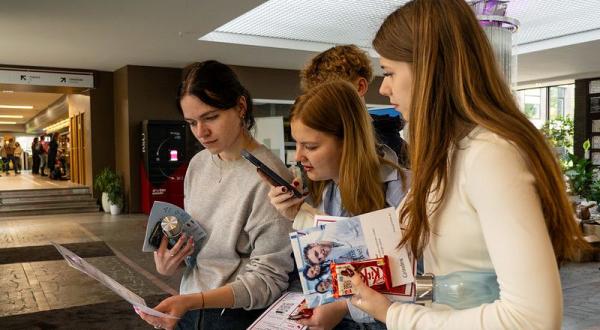Nursing Student Arturs Jirgensons On Working With COVID-19 Patients
Arturs Jirgensons is a nursing student at Rīga Stradiņš University (RSU). He plans to enrol in the Faculty of Medicine and wants to become a doctor. Since June last year, he has been working as a hospital orderly in the Department of Resuscitation and Intensive Care at Pauls Stradiņš Clinical University Hospital, where his main responsibilities include feeding, washing and repositioning patients to avoid bedsores.
Arturs before his shift at the Department of Resuscitation and Intensive Care at Pauls Stradiņš Clinical University Hospital. Photo from private archive.
What thoughts and feelings do you have when your shift ends?
My shift is 24 hours long. After I leave the hospital, a huge wave of energy comes over me together with the satisfying feeling of knowing that I have done something very important. This feeling makes all the hard work, my aching legs and the heavy workload worth it.
What is the hardest part of your job?
It is often difficult to see patients whose health is deteriorating, but at other times it is the amount of responsibilities I have and the long shifts that make the job difficult.
Why did you choose to study nursing?
It's an interesting story. I didn't know what to study after graduating secondary school. I had an idea to wait for a year and then decide, but my parents wisely asked me to at least try to apply to a programme that I might like to study. I applied to RSU. Unfortunately, I had not taken the biology exam, so I didn't get into the Faculty of Medicine, but I received a state-funded study place in Nursing.
When I started studying, I realised how much I liked medicine and wanted it to be a bigger part of my life. I then remembered how much I used to enjoy listening to my mother's stories about the hospital where she works as a nurse.
As a child, I always wanted to help people and be the hero that saves them with a big and sincere smile.
And that is why I'm studying nursing. After graduating I will enter the Faculty of Medicine and study on to become a doctor.
What encouraged you to apply for a job in a hospital while you are still studying?
First and foremost it was the COVID-19 pandemic, and additionally my parents told me that working in a hospital can be a great experience, because you encounter the problems and cases in person that were used as examples during your studies.
You started working in the hospital in June when the situation was different from what it is now. Other students have said that seeing the realities of hospital work has made them afraid at one point or another. How do you feel about the COVID-19 crisis?
Everything was calmer in June. There was only one isolation ward with two rooms for patients with COVID-19 in the intensive care unit, but now all rooms in the unit are for COVID-19 patients. I see them every shift. Frankly, I'm not afraid of getting sick because I'm a young and healthy person, but I am worried about the risk of complications. Overall, I feel relatively calm.
What do you think the biggest challenges in the fight against COVID-19 are right now?
The biggest challenge is people themselves. Every day when I log on to Facebook, I see posts about COVID-19 and comments from people who think it's all a joke.
Reading the comments, I wish that the people who deny COVID-19 could get up from their couches and work one 24-hour shift in a hospital to see what it’s like to care for patients who can do nothing more than just lie still, hooked up to artificial respiration, waiting for a miracle.
It’s painful to see patients who can no longer breathe on their own, fighting every day just to stay alive.
What advice do you have for others in these difficult times?
Love life! Love yourself! Love others! No matter how depressing and sad it may sound, death could come at any time and a person may not be able to say such simple words as "I love you" or "I’m sorry” to their relatives and loved ones.






